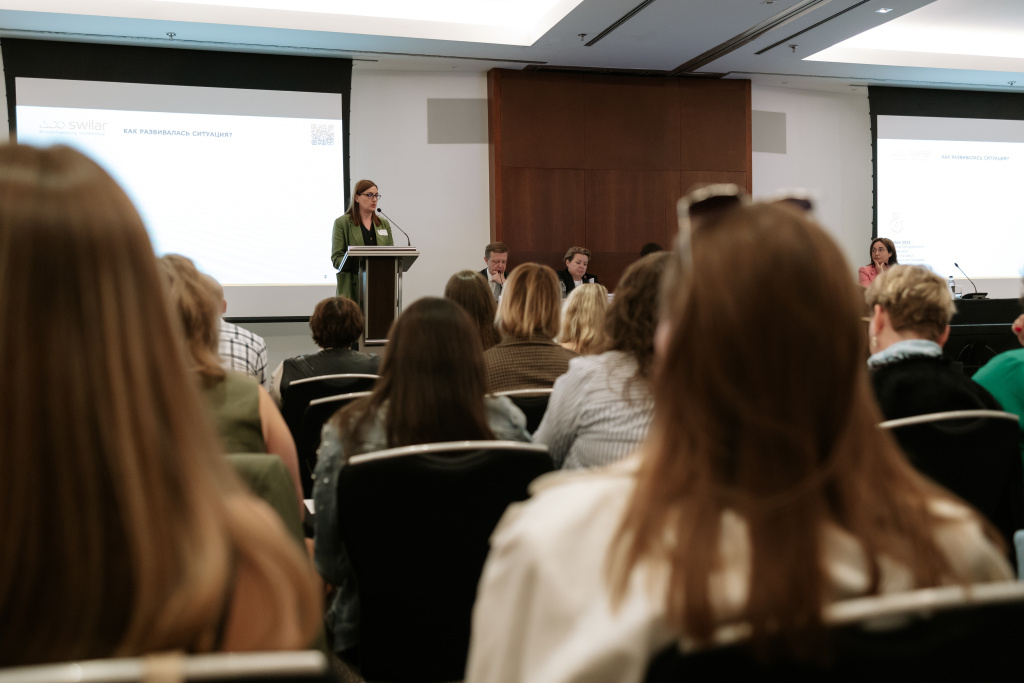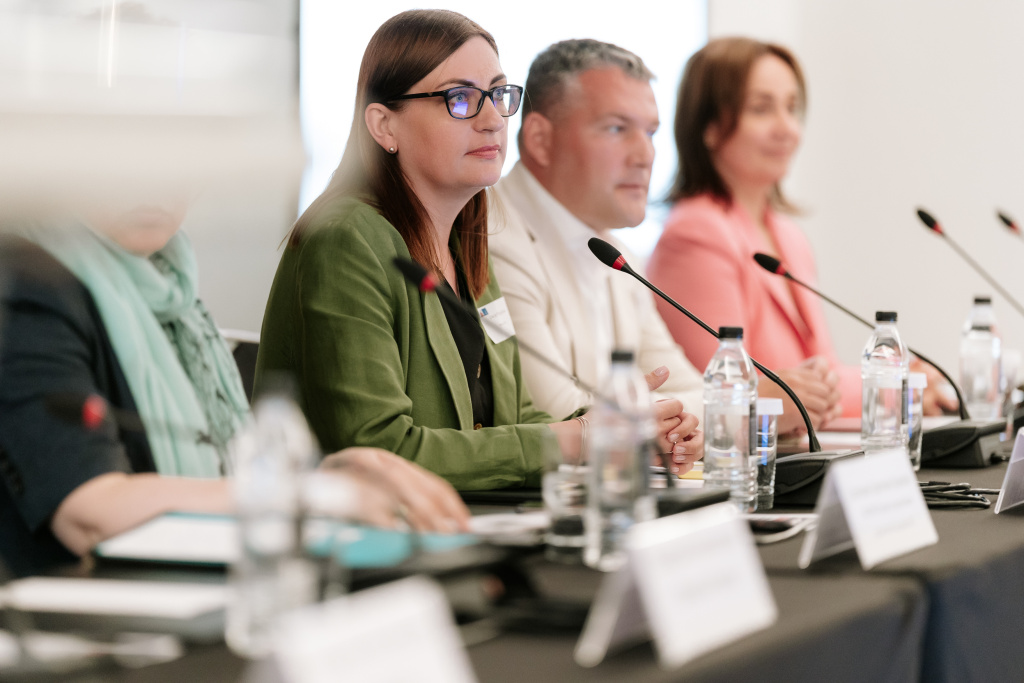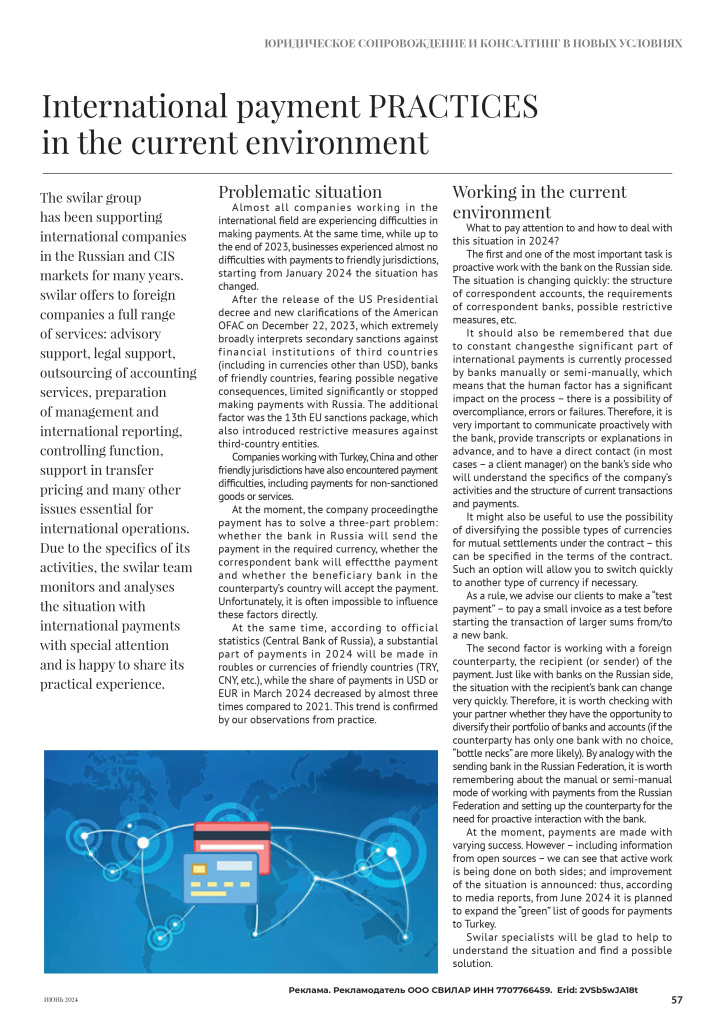Category: News
Briefing “Central Asia market development: Kazakhstan” Almaty
Daria Pogodina made a presentation at the briefing in Almaty on the topic “How to check your counterparty in Kazakhstan from abroad?”. During her presentation Daria talked about key sources of information for checking the reliability of partners in Kazakhstan, legal aspects of access to data, typical risks and ways to minimize them. The presentation was aimed at international companies planning business cooperation in the region, and included practical advice on remote verification of counterparties.
Other news

10.02.2026
Environmental Fee: what changed since January 1, 2026 and what business should expect

23.12.2025
Dear colleagues, Please accept our sincere congratulations on the upcoming New Year and Christmas!
Russian-German Chamber of Commerce
Daria Pogodina spoke at the event organized by the Russian-German Chamber of Commerce, presented an up-to-date overview of restrictions and requirements affecting cross-border settlements and also covered practical aspects of interaction with banks, currency control and approvals with the government commission. The report aroused great interest among participants conducting foreign economic activity with partners in the EU and other jurisdictions.
Other news

10.02.2026
Environmental Fee: what changed since January 1, 2026 and what business should expect

23.12.2025
Dear colleagues, Please accept our sincere congratulations on the upcoming New Year and Christmas!
swilar at the Russian-German Chamber of Commerce Conference
On June 5, swilar spoke at the annual Conference for CFOs of the Tax and Financial Reporting Committee of the Russian-German Chamber of Commerce.
Daria Pogodina, CEO of swilar, spoke on the topic that the company constantly monitors — “The current situation with payments to friendly countries.” Conference participants highly appreciated the comprehensive analysis and effective practical recommendations that were given in the report.
The VTP conference became a platform for lively discussions and exchange of experience between CFOs of leading foreign companies, especially regarding the situation with expected tax changes, international payments and financial service management in the context of the economic crisis.


Other news

10.02.2026
Environmental Fee: what changed since January 1, 2026 and what business should expect

23.12.2025
Dear colleagues, Please accept our sincere congratulations on the upcoming New Year and Christmas!
Changes in corporate legislation from 01.09.2024
We hereby inform you that Federal Law No. 287-FZ of August 08, 2024 introduced a number of important changes affecting both limited liability companies (OOO) and joint-stock companies (AO). The changes come into effect at different times. In this message, we would like to talk about changes in relation to OOO that will be in effect from September 01, 2024.
From this date, the resolution on the election (appointment) of the sole executive body of the OOO – for example, the general director – will need to be necessarily certified by a notary. Also, when registering such changes in the Unified State Register of Legal Entities, a notary will be the applicant.
Thus, the procedure for changing the general director in an OOO has been significantly changed. Previously, participants could make such a resolution without a notary (if an alternative procedure was stipulated in the articles of association), and then the new director would sign the application for registration himself. Now the participants or their representatives will be required to be present at the Russian notary to make a resolution (with the issuance of the appropriate certificate), after which the notary will sign an application sent by him to the registration authority.
For foreign participants in Russian OOO, such changes mean the presence of two options:
- arrival in the Russian Federation and visiting a Russian notary to make a resolution on changing the director of a controlled Russian company;
- issuance of a power of attorney to Russian representatives for carrying out such actions (please note that the power of attorney must be properly legalized and translated into Russian).
At the moment, we are awaiting clarification regarding whether notarization will be mandatory for participants to make resolutions on extending the powers of the general directors of OOO, as well as the beginning of the liquidation of controlled companies.
With regard to the liquidation of an OOO, from September 01, it is legislatively confirmed that the notary submits to the Federal Tax Service (FTS) a notification about the formation of a liquidation commission/appointment of a liquidator. Such a notification is usually sent simultaneously with the message that the legal entity is entering into the process of liquidation. The notification shall be submitted to the Federal Tax Service by the notary who certified the liquidator’s signature on it, no later than the end of the working day on which the notification was signed.
According to another change, from September 01, the list of information on shares in the authorized capital of OOO, which is contained in the Unified State Register of Legal Entities, is being expanded. The Register will contain information about the arrest of the share imposed by the court or enforcement officer. So far, the Unified State Register of Legal Entities includes information on the size, nominal value of shares and shareholders.
In the future, we will inform you about other significant changes to corporate legislation introduced by Federal Law No. 287-FZ dated August 08, 2024.
We will be happy to answer your questions and, if necessary, support you in the preparation, signing and submission of relevant documents to the authorized bodies.
Contacts:
Maria Matrossowa
Nadezhda Maskaeva
Other news

10.02.2026
Environmental Fee: what changed since January 1, 2026 and what business should expect

23.12.2025
Dear colleagues, Please accept our sincere congratulations on the upcoming New Year and Christmas!
Counterparty verification in CIS countries: Kazakhstan
We would like to draw your attention to the screening possibilities of foreign counterparties in the Republic of Kazakhstan.
To reduce risks and check the reliability, solvency and security of your foreign counterparty, you should take the following steps:
- Legal check;
- Financial check;
- Check valid licences, if applicable;
- Check other factors such as publicly available information / business reputation: customer reviews, relationships with partners or contractors.
As part of the legal review of an LLP (Limited Liability Partnership or “TOO”), which acts as a separate legal entity based on its own Charter, you should request the following legal documents:
- Charter;
- Memorandum of Association (however, the counterparty may refuse to provide this as the provisions may be confidential);
- Resolution/protocol on the appointment of the directors;
- State registration certificate – certificate of registration. What to check: Consistency of the information in the certificate with other incorporation documents;
- Business Identification Number (BIN) – a unique number created for a legal entity (branch and representative office) and self-employed persons;
- Registration number of the VAT payer’s certificate.
Also pay attention to the company’s legal address for local authorities. It must be specified in the Charter and other documents when registering the LLP and can be either a commercial premises or a private address (e.g. the founder’s flat).
There are following risk factors:
- “mass registration address”;
- mismatch between the legal and actual addresses (when submitting to the tax office), which is especially relevant for VAT payer counterparties.
The charter capital of an LLP must be at least 100 times the monthly calculate on index (MCI) at the time of submitting the formation documents for state registration. Fr om January 1, 2024, the MCI will be 3,692 tenge, i.e. the minimum capital must be 369,700 tenge (approx. RUB 73,000). The charter capital must be fully paid within one year from the date of registration. For small companies (up to 100 employees, income up to 300,000 MCI/year) there is no minimum capital (it can therefore be 0 tenge).
The executive body can be collective (directorate) or individual (director). An LLP can have several directors who act independently of each other (but only natural persons).
In addition, we would like to draw your attention to the official regime of “suspension of activity” in the Republic of Kazakhstan (the official analogue of “sleep mode” in the Russian Federation). During suspension, a company cannot conduct any profitable activities, but it is not liquidated and can be reinstated. Information on companies whose activities have been suspended can be obtained from the website of the State Revenue Committee of the Ministry of Finance of the Republic of Kazakhstan (SRC).
Further, in case the signatory of the contract is a director acting on the basis of the Charter, you should check the following aspects:
- Timeliness of the authorization (the data in the decision / protocol of appointment should coincide with the data in the state registers);
- Duration of the authorization;
- Existence of possible restrictions (e.g. transactions above a certain amount may require the approval of the participants, this may be specified in the Charter);
- Delimitation of powers if there are several directors.
If the signatory of the contract is acting on the basis of a power of attorney, be sure to request and scrutinize it for:
- The authority of the person issuing the power of attorney. If it is not signed by a director, but by another person based on the power of attorney with the right of overriding power of attorney, you should also request and check the original power of attorney;
- Description of the powers of the person acting on the basis of the power of attorney.
Wh ere to get data (open sources):
- Portal of the Bureau of National Statistics of the Agency for Strategic Planning and Reforms of the Republic Kazakhstan (RK).
Here you can find basic information about the company.
- Portal of the State Revenue Committee of the Ministry of Finance of the RK (www.kgd.gov.kz).
Here you can find:
- Details on suspension / non-suspension of activities;
- Information on the absence (presence) of tax arrears;
- Total amount of taxes paid;
- Presence of the counterparty in the List of unreliable taxpayers;
- Information about being / not being in the process of liquidation.
Here you can find the availability of open and past court cases.
- Public procurement portal.
Here you can see if the counterparty is on the list of unfair participants in public procurement.
- Portal of the Electronic Government of the Republic of Kazakhstan Egov.kz.
Here you can find:
- Information about the registered legal entity as of a given date;
- Details of the latest amendments to the constituent documents;
- Information about participation of the legal entity in other legal entities;
- Information on the presence of branches and representative offices of the legal entity;
- Information on the category of the subject of entrepreneurship;
- Data on encumbrances (seizure) on the legal entity’s share;
- Information on recognition of the legal entity as an inactive legal entity or involvement of its participants in inactive legal entities.
Unfortunately, as in many other jurisdictions, to obtain full data from public official sources, in most cases verification or authorization may be required, which requires a local phone number or IIN / BIN (analogue to the Russian TIN). In this regard, it may be necessary to engage a local partner to carry out a full-fledged verification.
For bigger or more significant deals, of course, the financial condition of the counterparty should be checked. For this purpose, it is necessary to request and analyze financial and tax statements for the last reporting periods:
- Balance sheet,
- Profit and Loss Statement,
- Cash flow statement.
Analyzing the financial statements will help to understand how successful and sustainable the company is, and to identify problems / risk factors.
We would also advise you to look at:
- review of financial ratios,
- analysis of current assets and total debt,
- profit and loss analysis,
- and get information about the bank details of the counterparty in advance – not all banks in Kazakhstan accept and send payments to Russia or do so with restrictions on the type of currency / banks from the Russian Federation.
We will be happy to answer your questions and, if necessary, carry out a counterparty check at your request.
Contacts:
Maria Matrossowa
Nadezhda Maskaeva
Other news

10.02.2026
Environmental Fee: what changed since January 1, 2026 and what business should expect

23.12.2025
Dear colleagues, Please accept our sincere congratulations on the upcoming New Year and Christmas!
Review article “International payment practices in the current environment”
Exclusively for the Russian Business Guide magazine, Daria Pogodina, Managing Director of swilar presented a review article “International payment practices in the current environment”.
You can read the article online in Russian or English, or download two-language article in pdf-format by clicking the “Download en” button below the message.

Other news

10.02.2026
Environmental Fee: what changed since January 1, 2026 and what business should expect

23.12.2025
Dear colleagues, Please accept our sincere congratulations on the upcoming New Year and Christmas!
MTPP – changes in the transfer pricing from 01.01.2024
Eugenia Chernova spoke at the event of the Moscow Chamber of Commerce and Industry with the report “Changes in transfer pricing from 01.01.2024”. During her speech, the speaker analyzed in detail the key innovations that came into force at the beginning of the year including updated approaches to comparability, documentation structure and control by tax authorities. Particular attention was paid to practical recommendations for preparing reports and adapting internal procedures of companies. The report sparked an active discussion among specialists in the field of taxation and finance.
Other news

10.02.2026
Environmental Fee: what changed since January 1, 2026 and what business should expect

23.12.2025
Dear colleagues, Please accept our sincere congratulations on the upcoming New Year and Christmas!
CFO – Payments to friendly countries as of June 2024
Daria Pogodina presented an up-to-date overview of the regulation of cross-border settlements with so-called friendly jurisdictions, highlighted the requirements of currency legislation, the practice of banking support and the nuances of interaction with the government commission. The report was aimed at financial directors and aroused keen interest due to its practical focus and relevance.
Other news

10.02.2026
Environmental Fee: what changed since January 1, 2026 and what business should expect

23.12.2025
Dear colleagues, Please accept our sincere congratulations on the upcoming New Year and Christmas!
Planning the budget and financing of the company during the liquidation period
Eugenia Chernova spoke at a joint meeting of the Legal Affairs Committee, the Accounting Group and the Controlling Group with a report on “Planning the budget and financing of a company during liquidation”. The speaker covered key aspects of financial planning at the final stage of a company’s activities, including cost control, optimization of resource allocation, tax implications and interaction with counterparties. Both legal and accounting nuances were considered, which made the report especially useful for specialists involved in the liquidation process.
Other news

10.02.2026
Environmental Fee: what changed since January 1, 2026 and what business should expect

23.12.2025
Dear colleagues, Please accept our sincere congratulations on the upcoming New Year and Christmas!
Article “Association Russian-Turkish Dialogue. PRACTICE of international payments in current conditions”
Daria Pogodina wrote an article for the Russian-Turkish Dialogue Association on the topic of “International Payment Practices in Current Conditions”. In the article the speaker analyzes in detail the changes in the regulation of international settlements and their impact on businesses working with Turkey. New challenges arising in cross-border payments are considered, as well as practical recommendations for using alternative payment systems and minimizing risks. Particular attention is paid to issues of compliance with legislation and optimization of financial transactions in the context of instability in international markets.
Other news

10.02.2026
Environmental Fee: what changed since January 1, 2026 and what business should expect

23.12.2025
